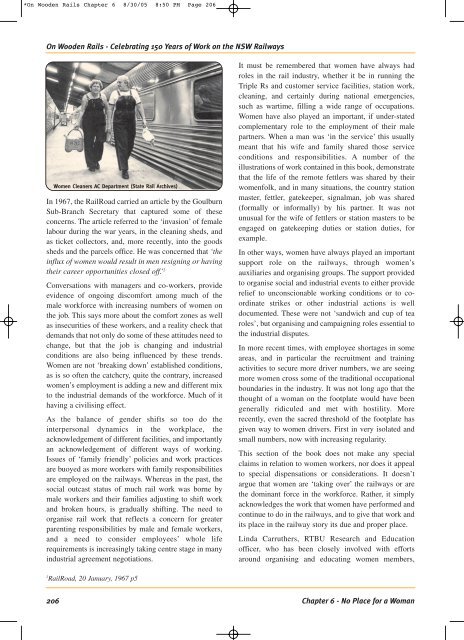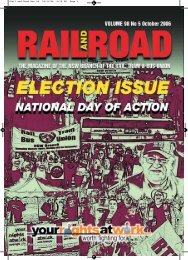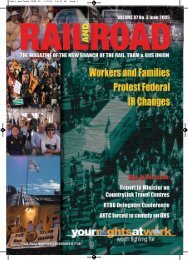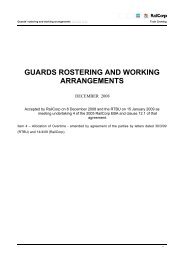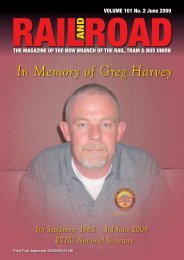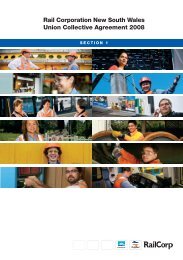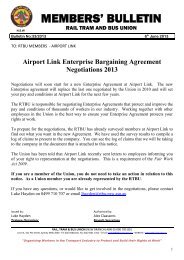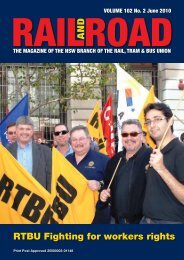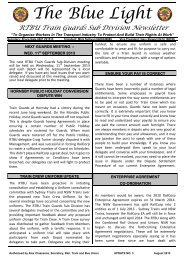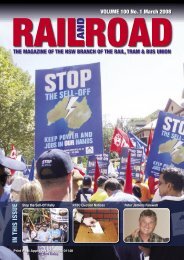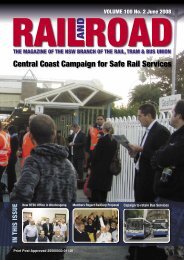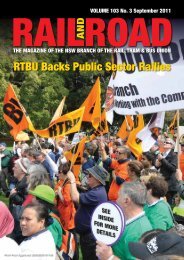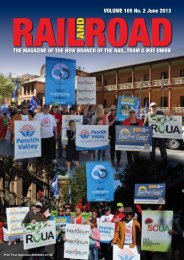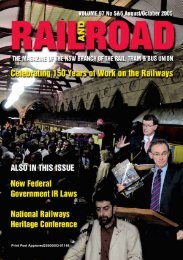Chapter 6: - Rail, Tram and Bus Union of NSW
Chapter 6: - Rail, Tram and Bus Union of NSW
Chapter 6: - Rail, Tram and Bus Union of NSW
Create successful ePaper yourself
Turn your PDF publications into a flip-book with our unique Google optimized e-Paper software.
*On Wooden <strong>Rail</strong>s <strong>Chapter</strong> 6 8/30/05 8:50 PM Page 206<br />
On Wooden <strong>Rail</strong>s - Celebrating 150 Years <strong>of</strong> Work on the <strong>NSW</strong> <strong>Rail</strong>ways<br />
In 1967, the <strong>Rail</strong>Road carried an article by the Goulburn<br />
Sub-Branch Secretary that captured some <strong>of</strong> these<br />
concerns. The article referred to the ‘invasion’ <strong>of</strong> female<br />
labour during the war years, in the cleaning sheds, <strong>and</strong><br />
as ticket collectors, <strong>and</strong>, more recently, into the goods<br />
sheds <strong>and</strong> the parcels <strong>of</strong>fice. He was concerned that ‘the<br />
influx <strong>of</strong> women would result in men resigning or having<br />
their career opportunities closed <strong>of</strong>f.’ 2<br />
Conversations with managers <strong>and</strong> co-workers, provide<br />
evidence <strong>of</strong> ongoing discomfort among much <strong>of</strong> the<br />
male workforce with increasing numbers <strong>of</strong> women on<br />
the job. This says more about the comfort zones as well<br />
as insecurities <strong>of</strong> these workers, <strong>and</strong> a reality check that<br />
dem<strong>and</strong>s that not only do some <strong>of</strong> these attitudes need to<br />
change, but that the job is changing <strong>and</strong> industrial<br />
conditions are also being influenced by these trends.<br />
Women are not ‘breaking down’ established conditions,<br />
as is so <strong>of</strong>ten the catchcry, quite the contrary, increased<br />
women’s employment is adding a new <strong>and</strong> different mix<br />
to the industrial dem<strong>and</strong>s <strong>of</strong> the workforce. Much <strong>of</strong> it<br />
having a civilising effect.<br />
As the balance <strong>of</strong> gender shifts so too do the<br />
interpersonal dynamics in the workplace, the<br />
acknowledgement <strong>of</strong> different facilities, <strong>and</strong> importantly<br />
an acknowledgement <strong>of</strong> different ways <strong>of</strong> working.<br />
Issues <strong>of</strong> ‘family friendly’ policies <strong>and</strong> work practices<br />
are buoyed as more workers with family responsibilities<br />
are employed on the railways. Whereas in the past, the<br />
social outcast status <strong>of</strong> much rail work was borne by<br />
male workers <strong>and</strong> their families adjusting to shift work<br />
<strong>and</strong> broken hours, is gradually shifting. The need to<br />
organise rail work that reflects a concern for greater<br />
parenting responsibilities by male <strong>and</strong> female workers,<br />
<strong>and</strong> a need to consider employees’ whole life<br />
requirements is increasingly taking centre stage in many<br />
industrial agreement negotiations.<br />
2 <strong>Rail</strong>Road, 20 January, 1967 p5<br />
206<br />
Women Cleaners AC Department (State <strong>Rail</strong> Archives)<br />
It must be remembered that women have always had<br />
roles in the rail industry, whether it be in running the<br />
Triple Rs <strong>and</strong> customer service facilities, station work,<br />
cleaning, <strong>and</strong> certainly during national emergencies,<br />
such as wartime, filling a wide range <strong>of</strong> occupations.<br />
Women have also played an important, if under-stated<br />
complementary role to the employment <strong>of</strong> their male<br />
partners. When a man was ‘in the service’ this usually<br />
meant that his wife <strong>and</strong> family shared those service<br />
conditions <strong>and</strong> responsibilities. A number <strong>of</strong> the<br />
illustrations <strong>of</strong> work contained in this book, demonstrate<br />
that the life <strong>of</strong> the remote fettlers was shared by their<br />
womenfolk, <strong>and</strong> in many situations, the country station<br />
master, fettler, gatekeeper, signalman, job was shared<br />
(formally or informally) by his partner. It was not<br />
unusual for the wife <strong>of</strong> fettlers or station masters to be<br />
engaged on gatekeeping duties or station duties, for<br />
example.<br />
In other ways, women have always played an important<br />
support role on the railways, through women’s<br />
auxiliaries <strong>and</strong> organising groups. The support provided<br />
to organise social <strong>and</strong> industrial events to either provide<br />
relief to unconscionable working conditions or to coordinate<br />
strikes or other industrial actions is well<br />
documented. These were not ‘s<strong>and</strong>wich <strong>and</strong> cup <strong>of</strong> tea<br />
roles’, but organising <strong>and</strong> campaigning roles essential to<br />
the industrial disputes.<br />
In more recent times, with employee shortages in some<br />
areas, <strong>and</strong> in particular the recruitment <strong>and</strong> training<br />
activities to secure more driver numbers, we are seeing<br />
more women cross some <strong>of</strong> the traditional occupational<br />
boundaries in the industry. It was not long ago that the<br />
thought <strong>of</strong> a woman on the footplate would have been<br />
generally ridiculed <strong>and</strong> met with hostility. More<br />
recently, even the sacred threshold <strong>of</strong> the footplate has<br />
given way to women drivers. First in very isolated <strong>and</strong><br />
small numbers, now with increasing regularity.<br />
This section <strong>of</strong> the book does not make any special<br />
claims in relation to women workers, nor does it appeal<br />
to special dispensations or considerations. It doesn’t<br />
argue that women are ‘taking over’ the railways or are<br />
the dominant force in the workforce. Rather, it simply<br />
acknowledges the work that women have performed <strong>and</strong><br />
continue to do in the railways, <strong>and</strong> to give that work <strong>and</strong><br />
its place in the railway story its due <strong>and</strong> proper place.<br />
Linda Carruthers, RTBU Research <strong>and</strong> Education<br />
<strong>of</strong>ficer, who has been closely involved with efforts<br />
around organising <strong>and</strong> educating women members,<br />
<strong>Chapter</strong> 6 - No Place for a Woman


